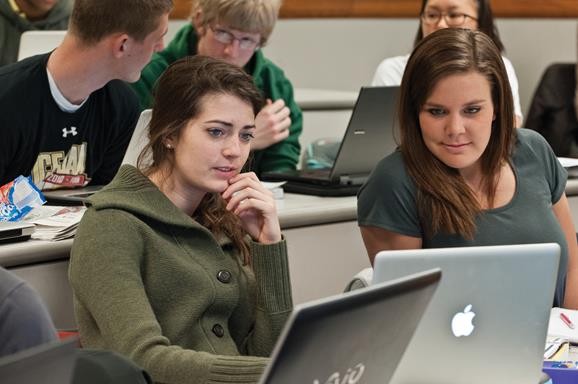Professor Hristina Nikolova puts a unique twist on marketing 101
Professor Hristina Nikolova teaches Marketing Principles, a core requirement for every Carroll School student. Last year, she tried something new with the course by introducing Shea Center case studies into the curriculum. It was her way of “keeping creative ideas in house,” and it’s working–revitalizing a core course and re-energizing students.
Dr. Nikolova, a Coughlin Sesquicentennial Assistant Professor (more on that later) has been teaching Marketing Principles for four years. The class is popular, but she’s always looking for ways to make it more dynamic, creative, and relevant. Then came the idea of focusing class projects on student-run startups instead of turning to the private sector, an approach she believes hasn’t been done before.
Good minds on the case
The new and improved Marketing 1021 is divided into two sections with 45 students in each. Intended for students planning a career in marketing or roles with marketing responsibilities, the course attracts a diverse cross-section of majors, from accounting to social sciences, along with plenty of management and marketing majors.
Each team of 45 students is assigned to a case. Their goal: help solve the startup’s marketing challenges. With that many good minds on the projects, each one gets plenty of brainpower behind it all semester long.
“The students are very entrepreneurial, so they have to think about marketing themselves,” says Nikolova. “This class exposes them to how to market startups.”
This year, the students are working on campaigns for two startups that won social impact awards in the Strakosch Venture Competition at our Spring 2017 Shea Center Celebration:
• UniMarkit, a peer-to peer marketplace app that lets college students easily and safely buy and sell everything from used books to furniture, filling a market need for 24 million students nationwide
• BusWays, an app that tracks the comings and goings of schoolchildren on and off the bus, offering a greater level of transparency in school transportation systems and peace of mind for parents
Micro-targeted marketing
For their fall 2017 launch strategy, UniMarkit founder Mark Dimeglio ’19
relied heavily on guerrilla, influencer, event, social media, and content marketing, supported by earned media, an ambassador program, and personal selling.
Although the campaign succeeded, Dimeglio and his team concede that what works at one school may not work at another. And with aggressive plans to launch the app on college campuses across North America, the pair needed truly out-of-the-box thinking.
While UniMarkit was targeting a niche market, BusWays founder Pedro de Almeida ’20 needed help building a public brand–micro-targeting on a macro scale. The app, which collects data through keychains attached to students’ backpacks and a reader on each bus, had already proven its value to school administrators.
But for the app to grow, it has to expand into school districts around the country, and that means not only reaching school administrators but convincing parents to sign up.
Relevance = real engagement
To kick off the projects, Dr. Nikolova invited the founders to come in at the beginning of the semester. At the end of the semester, they’ll come back for the two teams’ presentations.
Marketing 1021 students spend the weeks in between developing ideas that incorporate target customer analysis, competitive analysis, and an integrated marketing campaign. The campaign elements have one requirement: a storyboard for a commercial. Dr. Nikolova finds students enjoy this part of the process so much, many take the extra step to record the commercial.
“Students have always been engaged in this class,” she says. “Now they’re definitely engaged.”
Yet while students are excited to work on campaigns for campus startups, Dr. Nikolova points out an inherent challenge: their busy with their schoolwork.
“It’s more challenging to work with students than with an established company like MTV or Hasbro,” she says. “But I wanted to keep the expertise and creative ideas here in-house.”
Research and rewards
At the same time, Dr. Nikolova adds, the new curriculum has enhanced the dialogue, and students are getting more and more excited about marketing as the semester progresses.
“They’re very engaged in the classroom and very involved in the community too, which is so impressive since they’re so busy,” says Dr. Nikolova. “Some even want to change their major by the time the class is over.”
That’s the ultimate compliment for someone who started out as a project manager and then switched to teaching as an extension of her Ph.D. research into dyadic decision-making.
“I was always writing academic papers as a Ph.D. candidate,” Dr. Nikolova says. “I noted that people make decisions with their spouses, coworkers, and friends, and so many are social decisions, and I saw there wasn’t much literature about that.”
Dr. Nikolova’s research into dyadic decision-making earned her a coveted Coughlin Sesquicentennial grant and started her on the path toward teaching, which she says was a natural extension of the research.
“I know this is my job now. I have really found my place here,” Dr. Nikolova says. “And it’s really an honor to be able to teach students like this.”



